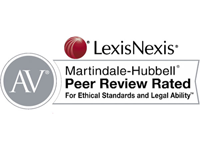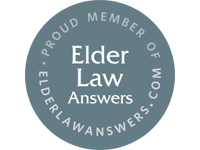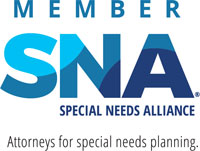Date: August 14, 2017
Readers who have attended our presentations will recall what we consider to be the three main objectives of comprehensive special needs estate planning: empowering agents to make important life decisions for a person with a disability, protecting government benefit eligibility, and providing good information for those who will carry on after the primary caregiver is gone. These core objectives apply regardless of whether we are working with clients of significant means or those with more modest assets. In this issue of The Special Needs Estate Planner, we focus on “17A Guardianship,” which is a commonly used proceeding to accomplish the first objective: appointing an agent to make important life decisions for someone who lacks the capacity to do so.
THE 17A GUARDIANSHIP
In New York State, individuals are assumed to be legally competent to make their own personal, medical and financial decisions upon attaining the age of 18. But what happens when an individual is not capable of making these decisions due to an intellectual or developmental disability? Many parents assume that they will continue to make decisions for their child even after the child reaches the age of 18, but this is not the case.
The good news is that New York’s Surrogate’s Courts offer an accessible guardianship process which authorizes parents and other caregivers to make important life decisions for individuals with disabilities after reaching the age of majority and continuing throughout the duration of the disability. This proceeding is commonly referred to as a “17A Guardianship” (referring to the Article of New York’s Surrogate’s Court Procedure Act where the procedure for securing this type of guardianship can be found). The 17A Guardianship proceeding can be brought on behalf of any individual with an intellectual or developmental disability having an onset prior to age 22, or on behalf of individuals with a traumatic brain injury sustained at any age.
Ideally, guardianship should be in place prior to in individual reaching 18 years of age so that there is no disruption in the parent’s or other advocate’s ability to make important life decisions for the person with the disability. If you believe an Article 17-A Guardianship is appropriate for your child, we recommend that you begin the process six (6) months prior to your child’s 18th birthday.
There are three main steps in the process. The first step is to prepare the written request to the Court (referred to as the “Petition”) and accompanying documents. The documents required in an Article 17-A Guardianship proceeding are sufficiently “user-friendly” such that most families will not need to hire an attorney unless the Petition will be asking for more complicated relief from the Court. For example, if the person with the disability recently received a financial windfall (such as a surprise inheritance or a personal injury settlement), it may be necessary for the Court to approve the establishment of a special (supplemental) needs trust as part of the Guardianship proceeding. This type of request is more complicated, and assistance from an attorney experienced in the area is strongly recommended.
In most cases, individuals who have just reached the age of majority do not own property of their own, and so families are able to handle the 17A Guardianship proceeding on their own. The checklist of information needed to complete the forms is available online (http://www.nycourts.gov/courthelp/DIY/guardianship17A.shtml). The online program collects the required information and prints out all forms, including the Petition. Most of the forms will require notarization, and Notary Publics are available at most banks or financial institutions.
If you are uncomfortable working online, you can call your County’s Surrogate’s Court and request an “Article 17-A Guardianship packet” which will contain the forms and directions on how to complete them
The Petition will ask for fairly detailed information about the Petitioners (i.e. the parents of the child with a disability or the individual petitioning to become guardian) and any individual over the age of 18 who resides in the home of the proposed Guardian. Everyone will need to provide their addresses for the past 28 years so that the New York Statewide Central Register of Child Abuse and Maltreatment can conduct a search for past abuse, neglect or maltreatment.
The third step is to secure proof of the disability using two forms produced by the online program or contained in the packed – a physician’s affirmation and a licensed psychologist’s affidavit (or two physician’s affirmations). These forms are intended to certify that the person with the disability is in need of guardianship, and ask the professionals to provide a detailed basis for their opinion along with a specific determination as to whether the person has the capacity to make health care decisions.
Once these steps are complete, the documents are filed with the Surrogates Court (including the form for the New York Statewide Central Register of Child Abuse and Maltreatment) and a modest filing fee is paid (usually $20). The Court will schedule a hearing where the individual with the disability will attend. The Court will issue a “Citation” (which is the written notice of the date and time of the hearing), and the Citation will need to be “served” (given to) the person with the disability, that person’s spouse (if applicable), the other parent (if a joint guardianship is not being sought) and any adult siblings. If the person with the disability resides in a residence certified by OPWDD (the New York State Office for Persons with Developmental Disabilities), the Executive Director of the agency operating the residence and the Mental Hygiene Legal Services will also need to be notified of the proceeding.
In most cases a Guardian Ad Litem (“GAL”) will be appointed by the Court to represent the interests of the person with a disability. The GAL reviews the file, meets with the person with the disability and the proposed Guardian and files a report with the Court. The GAL is typically an attorney, and is entitled to a fee for his or her work. The fee will be the responsibility of the Petitioners unless the person with the disability has assets of his or her own that can pay the fee.
At the hearing the Court will review all the documentation, including the GAL’s Report, and will issue a decision (referred to as a Decree) which confirms the appointment of Guardians of the Person, of the Property, or (most commonly) both. The Court will also issue “Letters of Guardianship” – a certificate which serves as evidence of the appointment.
A Guardian of the Property has ongoing property management and reporting responsibilities. A Guardian of the Property must:
– Confirm that all of the property of the person with the disability has been collected and deposited into a Court-supervised account;
– Request Court approval for any withdrawal from such account; and
– Prepare and file Annual Reports of account activity. Note that Social Security Disability and Supplemental Security Income payments are not subject to these reporting and oversight responsibilities. These programs are federal benefits and tare subject to a separate oversight system – the Representative Payee system – which governs the appointment of individuals to manage those benefits for individuals with disabilities.
While a Guardian of the Person in a 17A Guardianship does not have an annual reporting requirement under current law, it is important to remember that a Guardian of the Person nonetheless has a fiduciary relationship to the individual with the disability. This means that the Guardian of the Person has an ongoing obligation to remain informed, involved, and to make decisions in the best interest of the individual with the disability. Some courts have initiated their own “personal needs accounting” which is an annual report providing information about the location and well-being of the person with a disability.
CHANGES ON THE HORIZON?
The relative ease by which parents and other caregivers can become Article 17A Guardians has been one of its advantages since its enactment nearly 50 years ago. On the other hand, in recent years the law has been subject to criticism by a number of disability advocates, theconcern being that the process for establishing guardianship does not sufficiently protect the due process rights of the individual with the disability.
These advocates raise some very important issues, not the least of which is that the 17A statute is designed to grant guardianship based on a diagnosis, and does not require the Court to determine whether there are certain powers that the Guardian should NOT be granted. The advocates argue that the approach taken by New York’s other, newer guardianship statute – Article 81 of the Mental Hygiene Law – is the better approach, as it requires the Court to concentrate on function rather than diagnosis. If the Article 81 Court finds that a person is able to handle certain responsibilities – despite the individual’s disability – then the Guardian should not be granted any authority in those areas, thereby preserving the individual’s independence and right to self-determine as much as possible.
Most people agree with this approach as a matter of principle. The reason why many families do not utilize the Article 81 statute – which is available to individuals with disabilities of any age – is that the process is much more involved and as a result is often significantly more expensive than the 17A Guardianship process. An attorney is needed to commence an Article 81 Guardianship proceeding, the hearing itself is longer and more extensive, and the annual reporting requirements are substantial.
The issue recently came to a head when Disability Rights New York (DRNY) – a non-profit organization which advocates for individuals with disabilities – filed a lawsuit in federal court arguing that Article 17A violates the due process and equal protection rights of individual with disabilities. New York’s Attorney General filed a ‘motion to dismiss’ the lawsuit, and some advocates are urging New York State to change some of the language of the statute to address the issues laid out in the lawsuit. The matter is still pending as we write this newsletter.
WHAT TO DO IN LIGHT OF THE LAWSUIT?
Article 17A remains good law in New York, at least for now. And while people on both sides of the issue continue to advocate their positions in court and with their legislators, parents and other advocates will still be faced with the dilemma of having a child or other loved one reach the age of majority without having the capacity to make important life decisions.
When we discuss this issue with our clients, we try to educate them on the differences between the Article 81 and Article 17A statutes, and we also remind them that for individuals with mild cognitive disabilities, Advance Directives (Power of Attorney, Health Care Proxy and Living Will) may be an appropriate means of achieving the same end. There is also a movement in New York to enable Supported Decision Making. Information on these efforts can be found at www.sdmny.org.
Different clients approach these delicate issues in different ways. For our part, we simply want to ensure that our clients wrestle with this issue before a family member with a cognitive disability reaches the age of majority.
NEWS AND NOTES
Michael Dezik, Katherine Carpenter Appointed to Bar Association Posts
Wilcenski & Pleat is proud to announce that Michael (“Mike”) Dezik and Katherine (“Katy”) Carpenter received posts on the Executive Committee of the Elder Law and Special Needs Section of the New York State Bar Association. Mike was appointed as co-chair of the Medicaid Committee. Katy was elected as the 4th Judicial District Delegate, beginning a 2 year term on June 1, 2017. In addition, Katy was appointed as co-vice chair of the Section’s Publications committee where she assists with the production of the quarterly law journal for the Section. Currently, our own Tara Anne Pleat is the co-editor in chief of the Journal’s quarterly publication.
Michael Dezik co-chairs successful Summer Meeting of the Elder Law and Special Needs Section of the New York State Bar Association
Attorney Mike Dezik co-chaired the annual Summer Meeting of the Elder Law and Special Needs Section of the New York State Bar Association in Lake Placid last month. In this role, Mike was responsible for the development of three days of programming and securing speakers on cutting edge topics relevant to Elder Law and Special Needs Practitioners around New York State. Kudos for a job well done!
This newsletter is not intended as a substitute for legal counsel. While every precaution has been taken to make this newsletter accurate, we assume no responsibility for errors or omissions, or for damages resulting from the use of the information in this newsletter. If you would like to be removed from our distribution list, please email us or call us at (518) 881-1621















